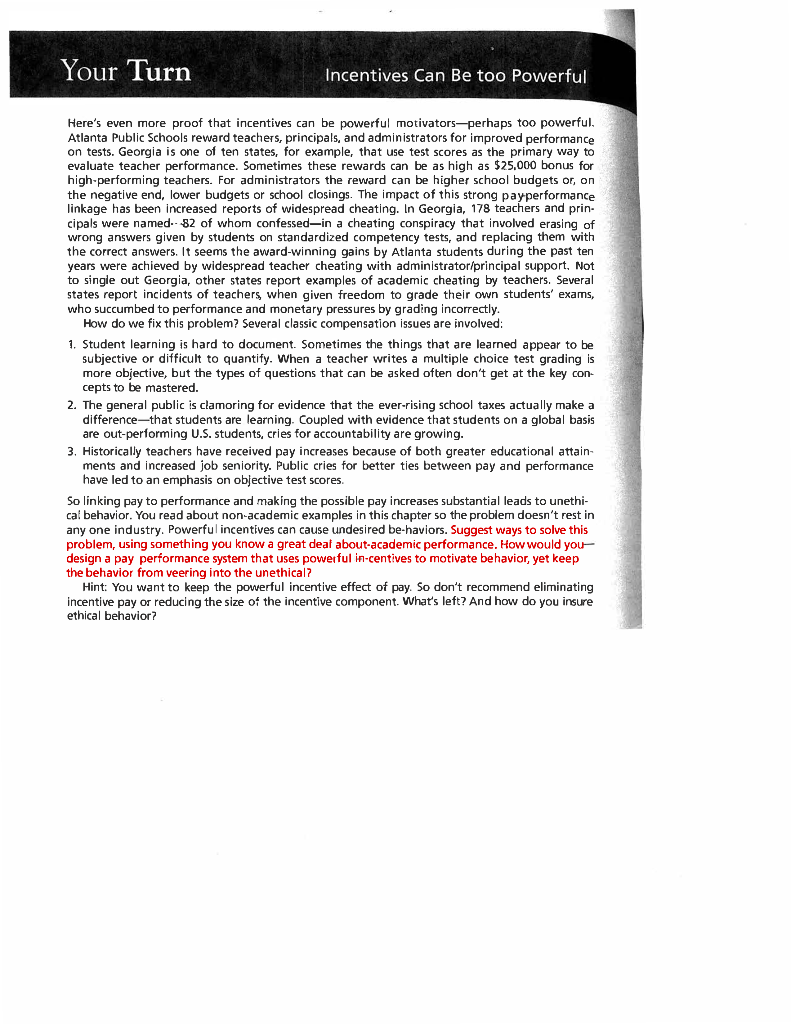Answered step by step
Verified Expert Solution
Question
1 Approved Answer
Read the attached document and answer the questions in 3-5 paragraphs. Here's even more proof that incentives can be powerful motivators-perhaps too powerful. Atlanta Public

Read the attached document and answer the questions in 3-5 paragraphs.
Here's even more proof that incentives can be powerful motivators-perhaps too powerful. Atlanta Public Schools reward teachers, principals, and administrators for improved performance on tests. Georgia is one of ten states, for example, that use test scores as the primary way to evaluate teacher performance. Sometimes these rewards can be as high as $25,000 bonus for high-performing teachers. For administrators the reward can be higher school budgets or, on the negative end, lower budgets or school closings. The impact of this strong payperformance linkage has been increased reports of widespread cheating. In Georgia, 178 teachers and principals were named.- 82 of whom confessed-in a cheating conspiracy that involved erasing of wrong answers given by students on standardized competency tests, and replacing them with the correct answers. It seems the award-winning gains by Atlanta students during the past ten years were achieved by widespread teacher cheating with administrator/principal support. Not to single out Georgia, other states report examples of academic cheating by teachers. Several states report incidents of teachers, when given freedom to grade their own students' exams, who succumbed to performance and monetary pressures by grading incorrectly. How do we fix this problem? Several classic compensation issues are involved: 1. Student learning is hard to document. Sometimes the things that are learned appear to be subjective or difficult to quantify. When a teacher writes a multiple choice test grading is more objective, but the types of questions that can be asked often don't get at the key concepts to be mastered. 2. The general public is clamoring for evidence that the ever-rising school taxes actually make a difference - that students are learning. Coupled with evidence that students on a global basis are out-performing U.S. students, eries for accountability are growing. 3. Historically teachers have received pay increases because of both greater educational attainments and increased job seniority. Public cries for better ties between pay and performance have led to an emphasis on objective test scores. So linking pay to performance and making the possible pay increases substantial leads to unethical behavior. You read about non-academic examples in this chapter so the problem doesn't rest in any one industry. Powerful incentives can cause undesired be-haviors. Suggest ways to solve this problem, using something you know a great deal about-academic performance. How would you design a pay performance system that uses powerful in-centives to motivate behavior, yet keep the behavior from veering into the unethical? Hint: You want to keep the powerful incentive effect of pay. So don't recommend eliminating incentive pay or reducing the size of the incentive component. What's left? And how do you insure ethical behavior? Here's even more proof that incentives can be powerful motivators-perhaps too powerful. Atlanta Public Schools reward teachers, principals, and administrators for improved performance on tests. Georgia is one of ten states, for example, that use test scores as the primary way to evaluate teacher performance. Sometimes these rewards can be as high as $25,000 bonus for high-performing teachers. For administrators the reward can be higher school budgets or, on the negative end, lower budgets or school closings. The impact of this strong payperformance linkage has been increased reports of widespread cheating. In Georgia, 178 teachers and principals were named.- 82 of whom confessed-in a cheating conspiracy that involved erasing of wrong answers given by students on standardized competency tests, and replacing them with the correct answers. It seems the award-winning gains by Atlanta students during the past ten years were achieved by widespread teacher cheating with administrator/principal support. Not to single out Georgia, other states report examples of academic cheating by teachers. Several states report incidents of teachers, when given freedom to grade their own students' exams, who succumbed to performance and monetary pressures by grading incorrectly. How do we fix this problem? Several classic compensation issues are involved: 1. Student learning is hard to document. Sometimes the things that are learned appear to be subjective or difficult to quantify. When a teacher writes a multiple choice test grading is more objective, but the types of questions that can be asked often don't get at the key concepts to be mastered. 2. The general public is clamoring for evidence that the ever-rising school taxes actually make a difference - that students are learning. Coupled with evidence that students on a global basis are out-performing U.S. students, eries for accountability are growing. 3. Historically teachers have received pay increases because of both greater educational attainments and increased job seniority. Public cries for better ties between pay and performance have led to an emphasis on objective test scores. So linking pay to performance and making the possible pay increases substantial leads to unethical behavior. You read about non-academic examples in this chapter so the problem doesn't rest in any one industry. Powerful incentives can cause undesired be-haviors. Suggest ways to solve this problem, using something you know a great deal about-academic performance. How would you design a pay performance system that uses powerful in-centives to motivate behavior, yet keep the behavior from veering into the unethical? Hint: You want to keep the powerful incentive effect of pay. So don't recommend eliminating incentive pay or reducing the size of the incentive component. What's left? And how do you insure ethical behaviorStep by Step Solution
There are 3 Steps involved in it
Step: 1

Get Instant Access to Expert-Tailored Solutions
See step-by-step solutions with expert insights and AI powered tools for academic success
Step: 2

Step: 3

Ace Your Homework with AI
Get the answers you need in no time with our AI-driven, step-by-step assistance
Get Started


